|
|
|
Sort Order |
|
|
|
Items / Page
|
|
|
|
|
|
|
| Srl | Item |
| 1 |
ID:
133236


|
|
|
|
|
| Publication |
2014.
|
| Summary/Abstract |
James Margach famously argued that Prime Ministers from Lloyd George to Callaghan had been intent on exploiting the media in their determination to centralise power. From Margaret Thatcher onwards, however, there is a strong argument that the power relationship has been reversed, and that the Leveson Inquiry-set up in the wake of the phone hacking scandal-exposed a political class which had become deeply fearful of the power and influence of the national press. Citing evidence to Leveson and subsequent recommendations by the inquiry, this article presents two case studies-on data protection and on media ownership-where the public interest clearly demanded political intervention, which would be inconvenient for the major publishers. And yet, despite recommendations by Lord Justice Leveson and despite clear support from leading politicians of all parties, there has been virtually no policy progress in either case. While the Leveson Inquiry was billed as a watershed in press-politician relations and an opportunity to counteract decades of unhealthy press power, political inertia in these two areas suggests that very little has changed.
|
|
|
|
|
|
|
|
|
|
|
|
|
|
|
|
| 2 |
ID:
159828
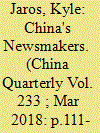

|
|
|
|
|
| Summary/Abstract |
Xi Jinping's rise to power in late 2012 brought immediate political realignments in China, but the extent of these shifts has remained unclear. In this paper, we evaluate whether the perceived changes associated with Xi Jinping's ascent – increased personalization of power, centralization of authority, Party dominance and anti-Western sentiment – were reflected in the content of provincial-level official media. As past research makes clear, media in China have strong signalling functions, and media coverage patterns can reveal which actors are up and down in politics. Applying innovations in automated text analysis to nearly two million newspaper articles published between 2011 and 2014, we identify and tabulate the individuals and organizations appearing in official media coverage in order to help characterize political shifts in the early years of Xi Jinping's leadership. We find substantively mixed and regionally varied trends in the media coverage of political actors, qualifying the prevailing picture of China's “new normal.” Provincial media coverage reflects increases in the personalization and centralization of political authority, but we find a drop in the media profile of Party organizations and see uneven declines in the media profile of foreign actors. More generally, we highlight marked variation across provinces in coverage trends.
|
|
|
|
|
|
|
|
|
|
|
|
|
|
|
|
| 3 |
ID:
130794
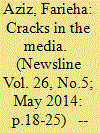

|
|
|
| 4 |
ID:
103583


|
|
|
|
|
| Publication |
2011.
|
| Summary/Abstract |
Studies of electoral authoritarianism in Southeast Asia highlight the significance of a compliant media in acting as an obstacle to democratization. Analyses of Malaysian politics are no different. Although the media in Malaysia is largely private, most observers point to the various legislative mechanisms and ownership structures through which compliance is ensured. Although most political scientists have concluded that such mechanisms ensure there is a progovernment bias, there have been few attempts to measure this bias and analyze its impact. With this study, the author aims to begin to fill that gap by studying the degree to which newspapers in Malaysia display partisanship in their coverage of Malaysian politics. To do so, two Malay-language newspapers were selected for coding, using two separate two-week periods as samples. The first period coincided with the March 2008 Malaysian general election, and the second, serving as a control, was from October 2006. Having demonstrated a clear degree of progovernment bias in both newspapers, the author then explores the factors postulated to explain this.
|
|
|
|
|
|
|
|
|
|
|
|
|
|
|
|
| 5 |
ID:
161397
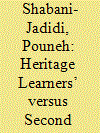

|
|
|
|
|
| Summary/Abstract |
This paper examines the acquisition particularities of advanced-level students. It also investigates the use of content-based—in this case media material—in teaching advanced-level students, as well as the impact of teaching such material on the students’ writing ability and overall proficiency. Finally, the subtle differences between heritage learners and second language learners are analyzed and discussed. Therefore, this research encompasses both a quantitative and a qualitative study of the issue at stake to ensure reliability of the findings. The results of the study suggest that there is no significant difference between the number of errors made by heritage learners and second language learners; however, the sources of these errors are often different. These sources of error and their possible reasons are discussed in this paper.
|
|
|
|
|
|
|
|
|
|
|
|
|
|
|
|
| 6 |
ID:
099658
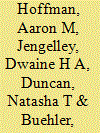

|
|
|
|
|
| Publication |
2010.
|
| Summary/Abstract |
Observers argue that the business of news is responsible for worsening the coverage of terrorism, but exactly how economic considerations influence coverage is controversial. Based on an analysis of over 1600 articles from The Washington Post and USA Today, we find that concerns about the effects of economic pressures on terrorism reporting are exaggerated. The business climate affects coverage, but the long-term impact of market pressures on coverage is modest. Articles about terrorist violence are increasingly prominent, but coverage of counterterrorism remains robust. Efforts to inoculate the press against the worst excesses of the market are unnecessary.
|
|
|
|
|
|
|
|
|
|
|
|
|
|
|
|
| 7 |
ID:
123772
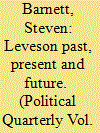

|
|
|
|
|
| Publication |
2013.
|
| Summary/Abstract |
As a result of the phone-hacking scandal and evidence of other serious journalistic abuses by some newspapers, the government set up the Leveson Inquiry to hear evidence from victims and to make recommendations for a new and effective system of press regulation. Leveson's recommendations for independent self-regulation overseen by a "recogniser" was seen as a moderate solution which would uphold the principle of an unfettered press while providing appropriate protection from unscrupulous or unethical press behaviour. After historic cross-party agreement, Parliament passed a resolution accepting a Royal Charter which adopted the great majority of his recommendations. In response, Britain's main national newspapers have pursued a campaign of systematic misinformation and distortion, aimed at discrediting the inquiry, its supporters and the cross-party Charter, while promoting a different system which would remain almost wholly controlled by the industry and would in practice be little different from the discredited Press Complaints Commission. After decades of ineffectual political response to press abuse and press power, there is now a historic opportunity for Parliament to assert its sovereign power. Over the next 12-18 months, we will see whether we have reached a genuine milestone in British public life or whether the British press will remain the last bastion of unaccountable power.
|
|
|
|
|
|
|
|
|
|
|
|
|
|
|
|
| 8 |
ID:
177803
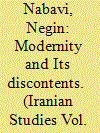

|
|
|
|
|
| Summary/Abstract |
The ratification of the Press Law in February 1908 marked a significant development in the history of censorship in Iran. However, in the little that has been written on this subject, the Press Law has been explained primarily in terms of constitutional politics, and the pressure that the first majles was put under by royalist forces who had been upset at the critical and anti-royalist tone of constitutional newspapers. This article takes a different approach; it contextualizes the Press Law and evaluates it in light of the attempts at control that had been put into effect by the state in the pre-constitutional years. To this end, this article considers the largely untold story of censorship in Qājār Iran. How did the understanding of what censorship should entail evolve through the years? How was censorship exercised, and what challenges did censorship pose for both the authorities and the subjects in the Nāseri and Mozaffari eras, culminating in the Press Law in February 1908?
|
|
|
|
|
|
|
|
|
|
|
|
|
|
|
|
| 9 |
ID:
110558
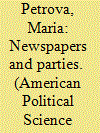

|
|
|
|
|
| Publication |
2011.
|
| Summary/Abstract |
Media freedom strongly inhibits corruption and promotes good governance, but what leads to media freedom? Do economic development and higher advertising revenues tend to make media outlets independent of political groups' influence? Using data on nineteenth-century American newspapers, I show that places with higher advertising revenues were likelier to have newspapers that were independent of political parties. Similar results hold when local advertising rates are instrumented by regulations on outdoor advertising and newspaper distribution. In addition, newly created newspapers were more likely to enter the market as independents in places with higher advertising rates. I also exploit the precise timing of major changes in advertising rates to identify how advertising revenues affected the entry of new newspapers. Finally, I demonstrate that economic development, and concomitant higher advertising revenue, is not the only reason that an independent press expands; political factors also played a role.
|
|
|
|
|
|
|
|
|
|
|
|
|
|
|
|
| 10 |
ID:
034480
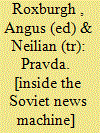

|
|
|
|
|
| Publication |
London, Victor Gollancg Ltd, 1987.
|
| Description |
285p.
|
| Standard Number |
0575037342
|
|
|
|
|
|
|
|
|
|
|
|
Copies: C:1/I:0,R:0,Q:0
Circulation
| Accession# | Call# | Current Location | Status | Policy | Location |
| 029499 | 077/ROX 029499 | Main | On Shelf | General | |
|
|
|
|
| 11 |
ID:
190965
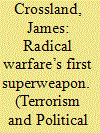

|
|
|
|
|
| Summary/Abstract |
This article retraces the forgotten legacy of a percussion triggered shrapnel scattering improvised explosive device (IED), known as the Orsini Bomb. Initially used in an attempt to assassinate Emperor Napoleon III in 1858, in the decades after, the Orsini Bomb was replicated, modified and deployed by regicides, insurgents and terrorists, and mythologised by the press as an omnipresent aspect of such forms of radical warfare. This article presents a “biography” of this unique IED, concluding, firstly, that Orsini’s design was an important point of reference in weapons manufacture for violent radicals even after the advent of dynamite in the 1860s and, secondly, that its reputation as a semiotic reference point for terrorist activity was enhanced by press reportage of its proliferation and use throughout the fin de siècle. In the final analysis, the Orsini Bomb became a transnationally recognised “brand” of weapon, synonymous with both assassination and insurgency. As such, the bomb’s reputation—often dwarfed in the historiography of political violence by dynamite—needs to be reconsidered.
|
|
|
|
|
|
|
|
|
|
|
|
|
|
|
|
| 12 |
ID:
147849
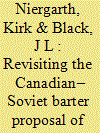

|
|
|
|
|
| Summary/Abstract |
In the autumn of 1932, when Canada had massive agricultural surpluses and hunger was afflicting millions of Soviet citizens, a proposal to trade Canadian cattle for Soviet fuels attracted considerable public support. Negotiated by a syndicate of Canadian businessmen, the cattle–oil barter deal was initially stalled because Conservative prime minister R.B. Bennett was ideologically opposed to it. Soviet documents suggest that this was not the end of the story. Revisiting the cattle–oil barter in light of these documents complicates current accounts of Canadian–Soviet relations in this period and raises questions about the Bennett government’s attitude to international trade and sensitivity to the kind of public pressure exerted by the proposal’s many Canadian supporters. In spite of major obstacles, the potential mutual benefit of the project nearly overcame ingrained mutual distrust.
|
|
|
|
|
|
|
|
|
|
|
|
|
|
|
|
| 13 |
ID:
132663
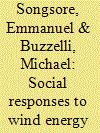

|
|
|
|
|
| Publication |
2014.
|
| Summary/Abstract |
This study documents and analyzes the role of health risk perceptions and other associated concerns of wind energy development (henceforth WED) in Ontario. Drawing on the risk society framework, we conduct a longitudinal media content analysis to document and analyze perceptions of and responses to WED over a nine year period. Attention is paid to temporal variations in responses relative to Ontario×s Green Energy Act (2009) (henceforth GEA); legislation aimed at the rapid expansion of renewable energy. The study reveals that the most radical forms of resistance to WED on health grounds are driven by perceived injustices in the treatment of potential at-risk citizens and citizens with health concerns. The GEA is fuelling these perceptions of injustices in subtle and nuanced ways, particularly by acting as a major confounder to health risk concerns. Contrary to several existing studies, we problematize the use of financial incentives to foster the development of wind energy. We also provide policy recommendations which include the need for increased public engagement in the WED process, the importance of using third party health and environmental assessments to inform developments as well as the need for post-development strategies to address ongoing community concerns.
|
|
|
|
|
|
|
|
|
|
|
|
|
|
|
|
| 14 |
ID:
142078


|
|
|
|
|
| Summary/Abstract |
We analyze and compare three separate efforts to code bias in Malaysia's media and find strong empirical evidence of an ongoing and profound progovernment bias in coverage. We also find, however, significant variation in bias between different types of news outlets. While Malay and Anglophone sources tended to be strongly progovernment, Chinese-language and online outlets were far more impartial. We demonstrate that both the general bias and the variation in it are largely the result of two factors: (1) government censorship and (2) ownership structures that link many major outlets to the ruling coalition. These findings provide a detailed view of the struggle for media independence in a less-than-democratic regime and supply insight into media bias across both authoritarian and democratic regimes in Asia, as well as outside it.
|
|
|
|
|
|
|
|
|
|
|
|
|
|
|
|
|
|
|
|
|